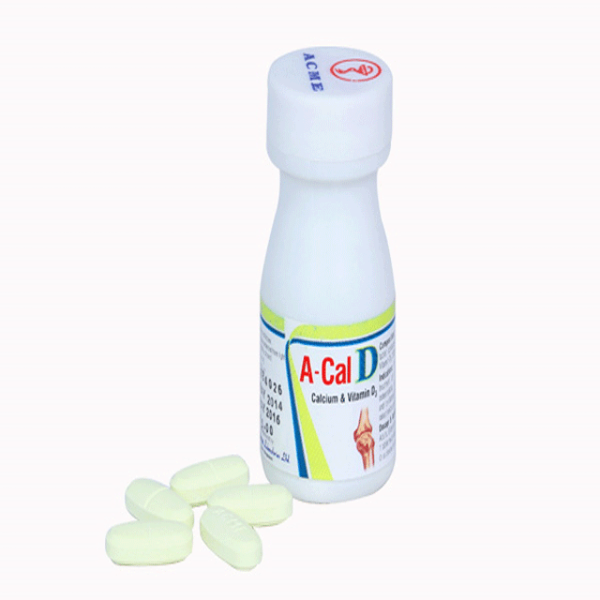
- Stock: In Stock
- Brand: Acme Laboratories Limited
- Product ID: Calcium 500 mg + Vitamin D3 200 IU Tablet
100% Secure Payment

A-Cal D 30s Tab
DESCRIPTION
A-CAL D tablet is a special preparation of Calcium and Vitamin D3. Calcium is an essential nutrient that helps to build and maintain healthy teeth and bones. It makes body's framework stronger by building bone. Most notably, Calcium helps to reduce the risk of osteoporosis, a disease that's characterized by a decrease in bone mass and an increase in bone fractures. Calcium also plays a role in muscle contraction, blood clotting and nerve function.Vitamin D3 is essential for healthy bones as it aids in calcium absorption from the GI tract. In addition to this it stimulates bone formation. Controlled clinical studies showed that Calcium and Vitamin D3 has synergistic effects on bone growth as well as in osteoporosis and fracture prevention.
COMPOSITION
Each film-coated tablet contains elemental Calcium 500 mg and Vitamin D3 200 IU.
INDICATIONS
Prevention and treatment of osteoporosis and fractures (both vertebral and non-vertebral); treatment of osteomalacia, rickets, tetany, hypoparathyroidism and secondary hyperparathyroidism; in kidney disease, pancreatitis, hyperoxaluria; as phosphate binder to reduce phosphate absorption in patients with hyperphosphatemia; during therapy with antiseizure medications, bisphosphonates in paget's disease; for healthy bone formation and maintenance; in disorders of osteogenesis and tooth formation (in addition to specific treatment); inpregnancy and lactation due to increased demand; in raised calcium requirement for children and adolescents at times of rapid growth; to prevent and cure calcium deficiency and/or vitamin D deficiency especially in the household people who do not get direct sunlight. DOSAGE AND ADMINISTRATION Adults, Elderly and children: 1 tablet twice daily. OR AS DIRECTED BY THE PHYSICIAN.
SIDE EFFECTS
The use of calcium supplements may cause constipation, and headache; mild hypercalcemia associated with anorexia, nausea and vomiting; more severe hypercalcemia associated with confusion, delirium, stupor and coma. The use of vitamin D may cause weakness, headache, somnolence, nausea, vomiting, dry mouth, constipation, muscle pain, bone pain, metallic taste, polyuria, polydipsia, anorexia, weight loss, nocturia and mild acidosis.
PRECAUTIONS
Patients with mild to moderate renal failure or mild hypercalciuria should be supervised carefully. Periodic checks of plasma calcium levels and urinary calcium excretion should be made in patients with a history of renal stones or in patients with mild to moderate renal failure or mild hypercalciuria. With long term treatment it is advisable to monitor serum and urinary calcium levels and kidney function and reduce or stop treatment temporarily if serum calcium level exceeds 12 mg/dl. Calcium salt should be used cautiously in patients with sarcoidosis, history of nephrolithiasis, cardiac disease and in patients receiving cardiac glycosides.
CONTRAINDICATIONS
It is contraindicated in patients having hypercalcaemia and severe hypercalciurea, ventricular fibrillation, hypervitaminosis, severe renal failure, kidney stones and hypersensitivity to any of the ingredients of the product.
DRUG INTERACTION
A-CAL D should not be used with the following medications because of
possible interactions - Iron; digoxin; verapamil; calcium, aluminium or magnesium containing antacids; other calcium or vitamin D supplements (e.g., calcitriol). Bran decreases the gastrointestinal absorption of calcium and may therefore decrease the efficacy of calcium supplements. Concurrent administration of thiazide diuretics may increase the risk of hypercalcemia. Co-administration of calcium with some drugs such as tetracycline antibiotics (e.g., doxycycline, minocycline), estramustine, levothyroxine, and quinolone antibiotics (e.g., ciprofloxacin, levofloxacin) can decrease the absorption of both calcium and the co-administered drug. Certain medications can decrease the absorption of vitamin D e.g., bile acid sequestrates such as cholestyramine/ colestipol, ketoconazole, mineral oil, orlistat. Certain drugs can accelerate the absorption of vitamin D e.g., phenytoin, phenobarbital.
OVER DOSAGE
If calcium supplements are taken at overdose for long time then hypercalcimia and hypercalciuria may rise. Symptoms of overdosage of vitamin D supplements include weakness, lassitude, impaired memory, dementia, depression, paranoia, hallucinations, delirium and coma. In case of overdose supplement should be discontinued. Treatment includes saline administration, furosemide diuresis and sometimes corticosteroids.
USE IN PREGNANCY AND LACTATION
A-CAL D should be used under the direction of a physician during pregnancy and lactation. Vitamin D and its metabolites pass into the breast milk in limited amounts.
SUPPLY
30 Tablet Pack : Each airtight plastic container contains 30 tablets.
15 Tablet Pack : Each airtight plastic container contains 15 tablets.




























